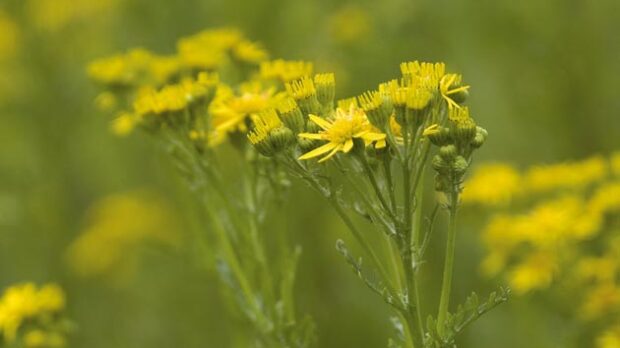The owner of a two-year-old cob who died of liver failure thought to be caused by eating ragwort is campaigning to raise awareness of the “silent assassin”.
Dave Offen and his family had owned Duke just four months when he was put to sleep last Wednesday (17 October).
Dave said he is “religious” about clearing and disposing of ragwort, but as its effects can be hidden for months, Dave believes Duke must have eaten the plant before he came to the family.
“We saw a post on Facebook saying this cob needed rehoming as he’d been dumped,” he told H&H. “So my other half raced off to get him straight away.
“He fitted in so well with our herd, and we’d all totally fallen in love with him.”

Dave said Duke’s condition had “come on leaps and bounds” from the emaciated state in which he had arrived, but last Saturday (13 October) he was not himself.
“He was acting a bit funny; taking himself away from the herd and into his stable, pushing his head against the wall, not eating much – so we got the vet,” Dave said.
“He could hear gut sounds but as Duke was showing colic-type signs, he gave him bute and buscopan, and Duke had perked up within 10 minutes.”
But Duke’s condition worsened, and blood tests showed he had liver failure, so the only option was to put him down.
“We spent the whole day with him and it was a lovely day,” Dave said. “But as our daughter said, we didn’t want him to suffer any longer, so the vet came and put him to sleep that night.
“The vet was pretty certain it was ragwort,” he said. “There was nothing we could have done, as once the damage is done, it’s done.”
Dave shared Duke’s story on social media to try to raise more awareness of ragwort.
“You see horses when you’re out, in fields with lot of ragwort and it’s sickening,” he said.
“On the Facebook post, lots of people were asking what ragwort is, and what it looks like; it’s concerning when you see horse owners asking that.”
Dave wants also to raise awareness of the correct ways to remove ragwort to minimise the chance of its returning, directing others to the British Horse Society’s online advice.
Continues below…
Q&A: Ragwort poisoning
The after-effects of ragwort poisoning can be treated using homeopathic remedies says HORSE magazine's homeopathic vet Nick Thompson

Subscribe to Horse & Hound magazine today – and enjoy unlimited website access all year round
He also plans to create a campaign website in Duke’s memory, and possibly make and distribute flyers warning of ragwort’s effects, to be shared by the public.
“I’ve had messages from people saying thank you, that they didn’t know but have now gone and cleared ragwort away so that’s great,” he said.
“On Duke’s last day, he was too weak to walk to the water butts, but he had one of the other boys on each side, propping him up so he could get there. It was lovely, but heartbreaking.
“We just want his death not to have been in vain, for him to leave a legacy, and if it saves one horse from this silent assassin, great, but we want to save as many as possible.
“It would be a fitting legacy to the lovely little fella he was.”
For all the latest news analysis, competition reports, interviews, features and much more, don’t miss Horse & Hound magazine, on sale every Thursday.



